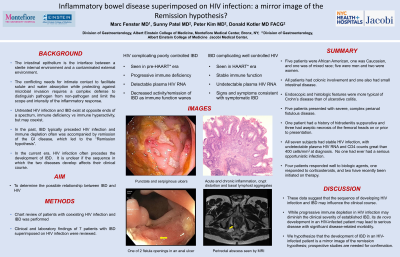Back

Poster Session B - Monday Morning
Category: IBD
B0361 - Inflammatory Bowel Disease Superimposed on HIV Infection: A Mirror Image of the Remission Hypothesis?
Monday, October 24, 2022
10:00 AM – 12:00 PM ET
Location: Crown Ballroom

- MF
Marc Fenster, MD
Montefiore Medical Center
WOODMERE, NY
Presenting Author(s)
Marc Fenster, MD, Sunny Patel, MD, Peter Kim, MD, Donald P. Kotler, MD
Jacobi Medical Center, Bronx, NY
Introduction: The intestinal epithelium is the interface between a sterile internal environment and a contaminated external environment. The conflicting needs for intimate contact to facilitate solute and water absorption while protecting against microbial invasion requires a complex defense to distinguish pathogen from non-pathogen and limit the scope and intensity of the inflammatory response. Untreated HIV infection and IBD exist at opposite ends of a spectrum, immune deficiency vs immune hyperactivity, but may coexist. In the past, IBD typically preceded HIV infection and immune depletion often was accompanied by remission of the GI disease, which led to the “Remission hypothesis”. In the current era, HIV infection often precedes the development of IBD. It is unclear if the sequence in which the two diseases develop affects their clinical course.
Methods: Chart review of patients with coexisting HIV infection and IBD was performed; clinical and laboratory findings of 7 patients with IBD superimposed on HIV infection were reviewed.
Results: Five patients were African American, one was Caucasian, and one was of mixed race; five were men and two were women. All patients had colonic involvement and one also had small intestinal disease. Endoscopic and histologic features were more typical of Crohn’s disease than of ulcerative colitis. Five patients presented with severe, complex perianal fistulous disease. One patient had a history of hidradenitis suppurativa and three had aseptic necrosis of the femoral heads on or prior to presentation.
All seven subjects had stable HIV infection, with undetectable plasma HIV RNA and CD4 counts great than 400 cells/mm3 at diagnosis. No one had ever had a serious opportunistic infection. Four patients responded well to biologic agents, one responded to corticosteroids, and two have recently been initiated on therapy.
Discussion: These data suggest that the sequence of developing HIV infection and IBD may influence the clinical course. While progressive immune depletion in HIV infection may diminish the clinical severity of established IBD, its de novo development in an HIV-infected patient may lead to serious disease with significant disease-related morbidity. We hypothesize that the development of IBD in an HIV-infected patient may be a mirror image of the remission hypothesis; prospective studies are needed for confirmation.
Disclosures:
Marc Fenster, MD, Sunny Patel, MD, Peter Kim, MD, Donald P. Kotler, MD. B0361 - Inflammatory Bowel Disease Superimposed on HIV Infection: A Mirror Image of the Remission Hypothesis?, ACG 2022 Annual Scientific Meeting Abstracts. Charlotte, NC: American College of Gastroenterology.
Jacobi Medical Center, Bronx, NY
Introduction: The intestinal epithelium is the interface between a sterile internal environment and a contaminated external environment. The conflicting needs for intimate contact to facilitate solute and water absorption while protecting against microbial invasion requires a complex defense to distinguish pathogen from non-pathogen and limit the scope and intensity of the inflammatory response. Untreated HIV infection and IBD exist at opposite ends of a spectrum, immune deficiency vs immune hyperactivity, but may coexist. In the past, IBD typically preceded HIV infection and immune depletion often was accompanied by remission of the GI disease, which led to the “Remission hypothesis”. In the current era, HIV infection often precedes the development of IBD. It is unclear if the sequence in which the two diseases develop affects their clinical course.
Methods: Chart review of patients with coexisting HIV infection and IBD was performed; clinical and laboratory findings of 7 patients with IBD superimposed on HIV infection were reviewed.
Results: Five patients were African American, one was Caucasian, and one was of mixed race; five were men and two were women. All patients had colonic involvement and one also had small intestinal disease. Endoscopic and histologic features were more typical of Crohn’s disease than of ulcerative colitis. Five patients presented with severe, complex perianal fistulous disease. One patient had a history of hidradenitis suppurativa and three had aseptic necrosis of the femoral heads on or prior to presentation.
All seven subjects had stable HIV infection, with undetectable plasma HIV RNA and CD4 counts great than 400 cells/mm3 at diagnosis. No one had ever had a serious opportunistic infection. Four patients responded well to biologic agents, one responded to corticosteroids, and two have recently been initiated on therapy.
Discussion: These data suggest that the sequence of developing HIV infection and IBD may influence the clinical course. While progressive immune depletion in HIV infection may diminish the clinical severity of established IBD, its de novo development in an HIV-infected patient may lead to serious disease with significant disease-related morbidity. We hypothesize that the development of IBD in an HIV-infected patient may be a mirror image of the remission hypothesis; prospective studies are needed for confirmation.
Disclosures:
Marc Fenster indicated no relevant financial relationships.
Sunny Patel indicated no relevant financial relationships.
Peter Kim indicated no relevant financial relationships.
Donald Kotler indicated no relevant financial relationships.
Marc Fenster, MD, Sunny Patel, MD, Peter Kim, MD, Donald P. Kotler, MD. B0361 - Inflammatory Bowel Disease Superimposed on HIV Infection: A Mirror Image of the Remission Hypothesis?, ACG 2022 Annual Scientific Meeting Abstracts. Charlotte, NC: American College of Gastroenterology.
